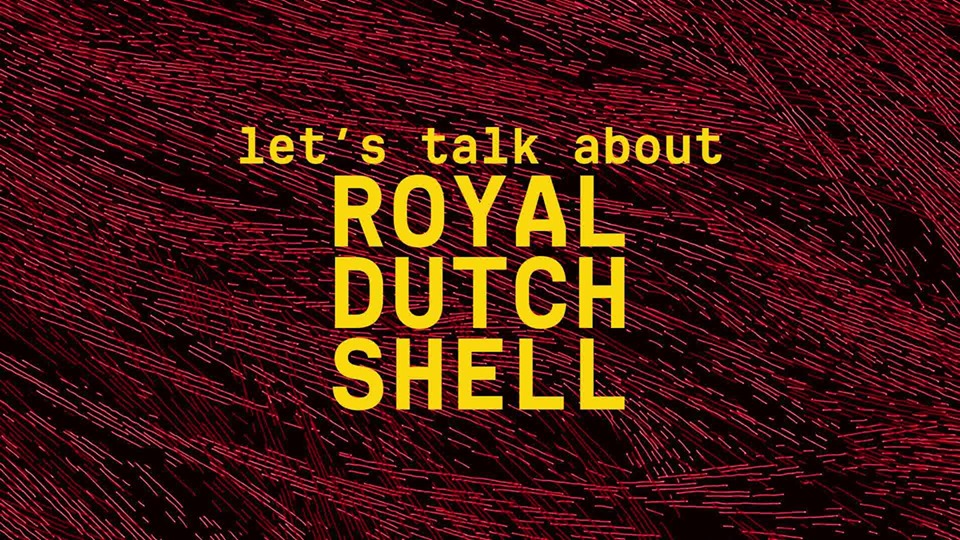By Jan-Willem Anker
Ten years ago, Fatih Birol, current director of the International Energy Agency (EIA) in Paris, predicted that the end of Shell was in sight. His vision, so sweet at the time, has alas failed to materialise. Alas? Yes, because Shell is the Dutch embodiment of the climate crisis.
Shell may be talking greener, but its bullshit is as brown as ever. To refresh your memory: there are only eight companies in the entire world emitting more CO2 than Shell does. Are you concerned about your personal ecological footprint? Every year Shell pumps twice as much CO2 into the atmosphere as the rest of the Netherlands combined. Rubbing salt into this wound, Shell chooses to invest a mere five percent of their research and development budget in clean energy. Five percent. Shell is a pyromaniac that sets our global house on fire and then offers us a bucket of water. The company has been aware of the catastrophic risks associated with global warming since the 1980s and has done nothing to avert it, and everything to distract from it. Their well-funded propaganda machine continues to generate intentionally misleading material, such as the recent ‘travel hack’ that was decimated as greenwash by comedian Arjen Lubach. Shell is present at training courses, schools and universities, to indoctrinate people from a very young age, working to maintain the illusion that the company treats the climate and the energy transition as important.
Shell is bad: the kind of bad that makes you shake your head and feels like a knot in your stomach. You wonder how Shell employees feel about all of this. Whether it starts gnawing at their conscience just before going to bed. Perhaps they are of the opinion, quite reasonably, that they cannot change such a large and administratively unwieldy organization on their own. Or that by taking measures that risk the company’s profit margins the shareholders will all walk away. So what happens in the meantime? Not long ago, Shell CEO Ben van Beurden, whose bank account expanded by twenty million euros in 2018, said: “I will pump everything I can pump up.” Pumper Van Beurden calls the energy issue “complex”. He likes to deflect the onus for action back onto politics, saying governments must take the decisions. Dodging Shell’s responsibility in this underhand and – let’s face it – despicable manner, he inadvertently points us towards a solution for breaking Shell’s stranglehold.
It is possible to choose to dismantle Shell together. If there is the political will, we can split off the sustainable parts of the company, nationalise the unsustainable parts and close them down. The most painful thing about this solution is that we may have to abandon the interests of shareholders, but so long as you are not a shareholder (!), you won’t have to worry about that. To prevent social unrest, we can compensate pension funds and other organizations that serve a social interest. That too is climate justice.
But won’t that cost a lot of money? Yes, it will. But if the energy transition, which is being hindered by Shell every day, does not go fast enough, the cost will be many multiples of that figure. Climate adaptation is anything but free. A country that has to deal with sea level rise and subsiding land mass must do everything it can to protect its population. What must not be forgotten are the direct benefits of dismantling Shell. All the knowledge and talent that is now hidden in the company can be released. With some retraining, Shell employees could apply their knowledge and experience to accelerate the energy transition. Who wouldn’t want that?
Maybe I haven’t convinced you yet. You may argue that with the dismantling of number nine on the list of largest polluters, eight even larger polluters will still remain active. To that I say: even in a globalised world, all beginnings are local. Letting things run their course is no option either. Decommissioning would provide the best guarantee that Shell’s infrastructure will be dismantled and disposed of in a responsible manner. Moreover, imagine the powerful shock wave that such a decision will have in the world. If this is possible in the Netherlands, it is also possible elsewhere.
If you still think that this is close to delusional, I want to remind you of the events of 2008. No fewer than three so-called “systemic banks” were nationalised: Fortis Nederland, ABN-AMRO and SNS REAAL. It cost billions. And those billions were made available without any public consultation whatsoever, because the government deemed it was necessary. It was a tough pill to swallow for the then finance minister and former Shell employee Wouter Bos, but he did it.
Because our politicians at national level lack the courage to tackle the multinational, campaigning remains an indispensable tool, not just to keep the pressure on Shell and our cowardly government leaders, on our cynical and indifferent parliamentarians, and on shrugging shareholders and chattering chairmen, but also as an expression of support to all those that know things can and must be done differently. That is why I agree: Shell Must Fall! And around the next shareholders meeting on 19 May 2020, we will get started on that.
This article is published in Dutch on Joop.nl

